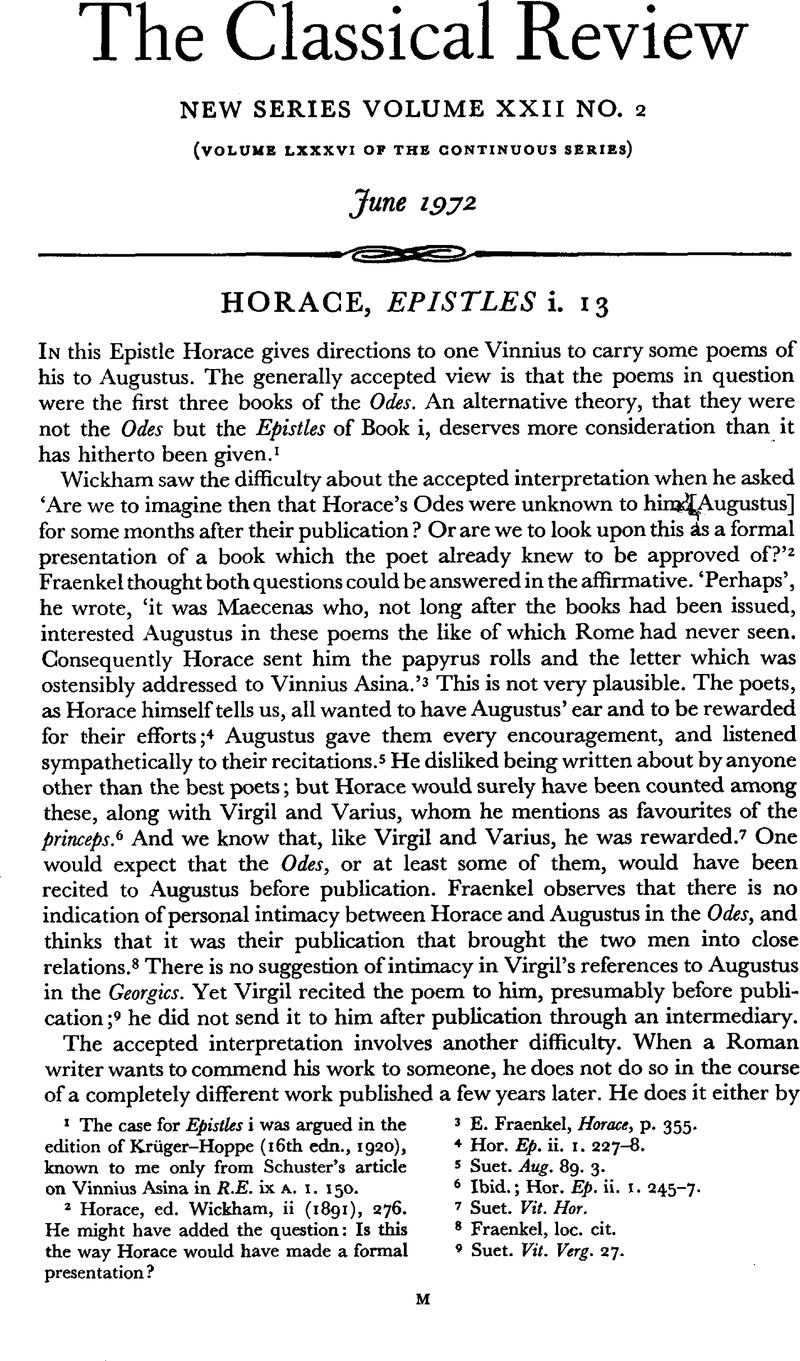No CrossRef data available.
Article contents
Horace, Epistles i. 13
Published online by Cambridge University Press: 27 February 2009
Abstract

- Type
- Review Article
- Information
- Copyright
- Copyright © The Classical Association 1972
References
page 157 note 1 The case for Epistles i was argued in the edition of Krüger–Hoppe (16th edn., 1920), known to me only from Schuster's article on Vinnius Asina in R.E. ix A. 1. 150.
page 157 note 2 Horace, ed. Wickham, ii (1891), 276. He might have added the question: Is this the way Horace would have made a formal presentation?
page 157 note 3 Fraenkel, E., Horace, p. 355.Google Scholar
page 157 note 4 Hor. Ep. ii. 1. 227–8.
page 157 note 5 Suet. Aug. 89. 3.
page 157 note 6 Ibid.; Hor. Ep. ii. 1. 245–7.
page 157 note 7 Suet. Vit. Hor.
page 157 note 8 Fraenkel, loc. cit.
page 157 note 9 Suet. Vit. Verg. 27.
page 158 note 1 Mart. i. 70; iii. 5; v. 6; vii. 26; x. 19; x. 104; xii. 3. In the case of the poem sent to Pliny (x. 19) we know that it produced results (Plin. Ep. iii. 21).
page 158 note 2 In iv. 82 Martial asks Rufus to commend two books to Venuleius; one would be that in which the poem appears.
page 158 note 3 Stat. Silv. iv. pref.
page 158 note 4 Cic. Fam. iii. 7. 2.
page 158 note 5 There is of course an illogicality here, since the seals of letters were designed to keep them secret from those other than the addressees; but the seals are equally out of howplace if Horace is sending the Odes after publication.
page 158 note 6 Stat. Silv. i. pref.; ii. ref.; iii. pref.
page 158 note 7 Plaut. Pseud. 706 (in libello hoc opsignato); Cic. Att. xi. 1. 1 (accepi a te signatum libellum).
page 158 note 8 Cic. Att. ii. 13. 1; v. 11. 7; v. 17. 1; viii. 5. 1, 2; xi. 9. 2; xi. 22. 1; xii. 53; Q.F. ii. 10. 4. Gellius (ix. 4. 1) found fasces librorum on sale at Brundisium, but these were old and in poor condition, being sold off cheap.
page 158 note 9 Hor. Sat. i. 10. 66, 75; ii. 1. 63. Cf. Ep. ii. 1. 69 (carmina Liui—presumably his Odyssey) and A.P. 91 (of comedy).
page 158 note 10 In C.Q. N.s. ix (1959) pp. 75–6; R.G.M. Nisbet suggested that the Vinnius of Ep. i. 13 was the centurion of that name in Augustus' praetorian guard mentioned by Pliny as a man of remarkable strength. He noted, howplace ever, that we cannot be sure that this Vinnius as early as 23 B.C. If the epistle was written three years later the identification might be thought a little more plausible.


